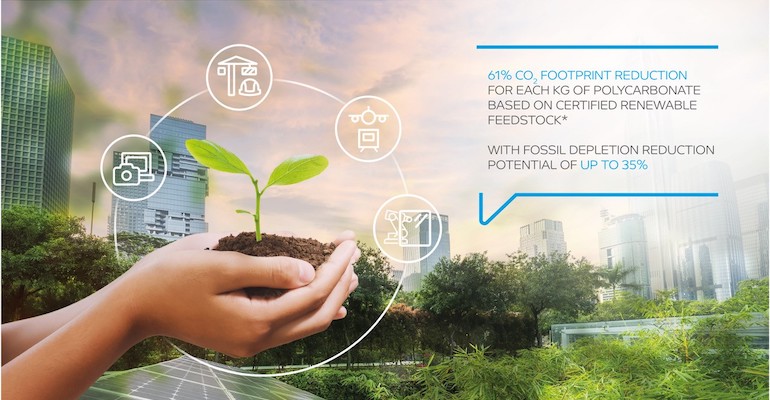Sabic first in industry to receive ISCC PLUS certification for polycarbonate film and sheet products based on certified renewable feedstock.
August 17, 2021

Sabic reports that its Functional Forms plant in Bergen op Zoom, Netherlands, has been accredited under the International Sustainability & Carbon Certification (ISCC) PLUS scheme for providing a new range of Lexan film and sheet products based on certified renewable feedstock. The new film and sheet product offering connects with the company’s existing Trucircle initiative and responds to a globally growing demand for sustainable materials in an increasingly more circular plastics economy.
“We are proud of being the first in the industry to receive ISCC PLUS certification for film and sheet products based on renewable polycarbonate,” said Bart Kiekens, Segment Leader, Electrical & Electronic Films, Europe, for Sabic’s Functional Forms business. “This gives our Lexan film and sheet customers a valid alternative for enhancing their environmental balance and achieving ambitious sustainability targets.”
The ISCC PLUS certification recognizes the implementation of a mass balance accounting system that traces material flow across complex supply chains from feedstock to final product by following predefined and transparent rules. These rules then define whether a product can be classified as renewable or circular. For Sabic this means that for each ton of renewable or circular feedstock fed into the production process and substituting fossil-based feedstock, approximately one ton of the output material can be classified as either renewable or circular. The mass balance approach also allows OEMs to document and quantify the sustainability of their applications made from these certified materials.
In addition, Sabic has performed a life cycle analysis (LCA) assessing the environmental performance of the renewable route in comparison to the traditional fossil-based route at both cradle-to-gate and cradle-to-gate plus end-of-life levels, relying on PAS (Publicly Available Specification Method for quantifying product carbon footprints) 2050 methodology for biogenic carbon accounting. The results show that each kilogram of Sabic’s polycarbonate resin based on certified renewable feedstock has the potential to reduce fossil depletion by up to 35% and lessen the carbon footprint of applications by up to 60%. Overall, this also makes a significant contribution to Sabic’s efforts of mitigating the impact of its products on climate change.
“Our new bio-based Lexan film and sheet products are manufactured using polycarbonate resin partially sourced from second-generation feedstock that is not in direct competition with the food chain,” said Alda Shabanaj, Product Manager Film & Mass Transportation, Europe, at Sabic. “The resulting materials can help our customers create value with durable and recyclable application solutions across multiple industries.”
Sabic’s innovative Lexan polycarbonate film and sheet products based on certified renewable feedstock, produced at the Bergen op Zoom site, are globally available and target demanding applications in a range of markets, including building and construction, electrical and electronics, automotive, mass transportation, and specialty glazing.
About the Author(s)
You May Also Like


